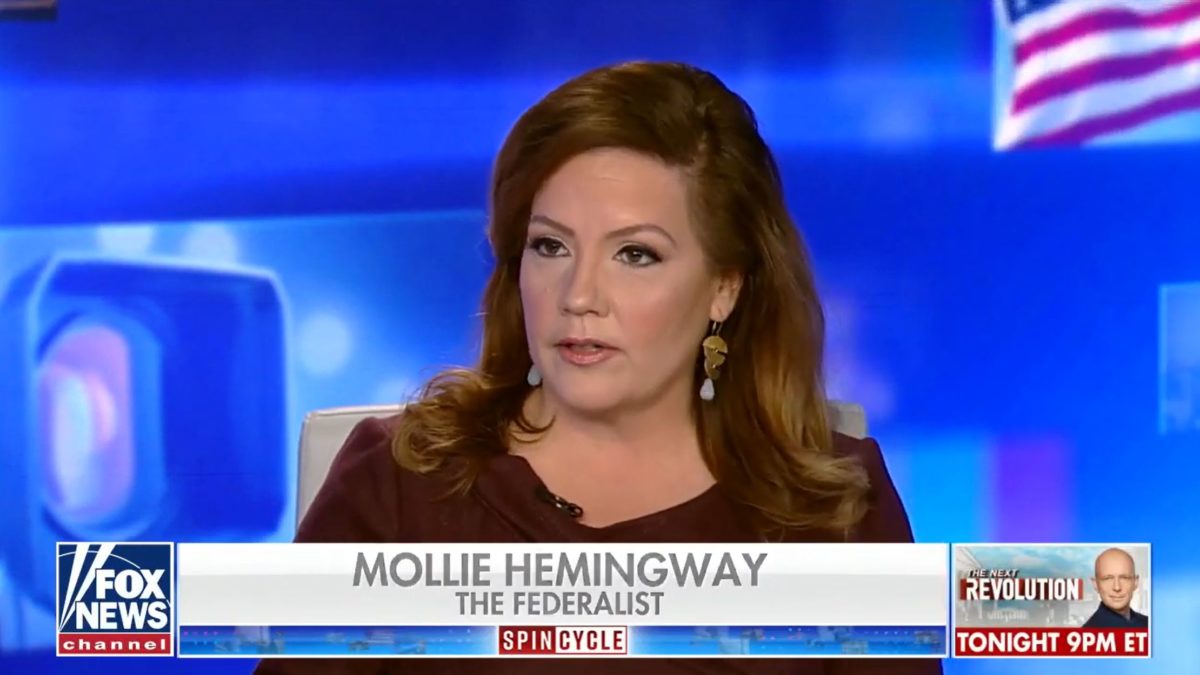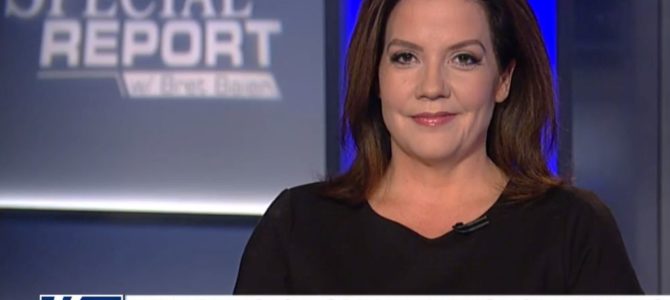
My favorite moment in more than six years working alongside David Harsanyi as co-senior editors of The Federalist occurred in June 2018.
David and I were the third-string hosts of the Federalist Radio Hour, and almost always did it as a pair. Because we designed The Federalist intentionally against an inside-the-beltway mentality, we have staff and writers all over the country. Even those of us who live in the D.C. area work from home.
Recording the podcasts is one of the few times we get to be together. I absolutely treasured doing the podcasts with David. As our producer Madeline Osburn can attest, David and I would spend a half hour discussing which songs to play during the podcast. He has excellent taste in music, and a deep and abiding love of songs with guitar-heavy intros. He’d roll his eyes at my love of alternative R&B. But we’d figure it out eventually.
The shows were full of us discussing issues of the day, sometimes squabbling a bit over them. David is far more concerned about populism than I am and recent years have amplified that difference between us. He never took our differences personally, something that is less common than it should be in political sparring. Last year, we were taping an episode of the podcast, discussing immigration policy and the recently released inspector general report detailing some of James Comey’s failures as head of the FBI.
At the end of our podcasts, we discussed pop culture, namely what movies and TV shows we were watching, and any updates about our problematically large vinyl record collections. David is an incisive cultural critic. But he has the worst taste in television shows of anyone I have ever met. For years I would start watching his recommendations only to fall asleep or otherwise be bored. I teased him about it mercilessly.
After telling him that I’d recently re-watched and enjoyed “Dirty Rotten Scoundrels,” he began telling me about a new television show he’d taken up. He described it as something like, “People from England take their retirement nest and go to Croatia or Brittany and spend an hour looking for a place to retire, checking out neighborhoods.”
From the moment he began describing it (somewhere around the 44:00 mark), I fell out laughing. He made me laugh all the time during our podcasts — our rapport couldn’t be better — but this time I completely lost it. I couldn’t stop guffawing, explaining between gasps for air that I wasn’t sure if he was making up a show to sound really boring or if it really exists.
“It’s called ‘Moving to the Continent,'” he dryly said, over my uncontrollable laughter. It is real, although it’s actually called “Escape to the Continent.” We went on to discuss how much we prefer the stoicism of British reality television to the melodrama of U.S. reality shows. And even though I swore I would stop taking his television recommendations, I shared the advice with my husband and we watched a few episodes. They were better than some of his other recommendations, but still not worth it.
I used to occasionally re-listen to the part of the podcast where he made me laugh. After he told me that he was moving on after more than six years of daily, side-by-side work putting out The Federalist, I listened again and cried. I have never enjoyed working with a colleague as much as I enjoy working with David Harsanyi.
We started together as the first senior editors of The Federalist in September 2013. I had long admired David, but had never met him. He had previously held my dream job — the classical liberal columnist at the Denver Post. I read him religiously and loved his writing. In a sea of boring and predictable columnists, David has always somehow been both consistent and invigorating.
It’s safe to say that neither of us truly knew what we were getting into when we launched our daily web magazine. David and I worked as closely together as anyone. Our staff was so small then, and we were writing, editing, commissioning pieces, and generally working around the clock. We slept so little those first couple of years that I have no idea how we made it.
We had ideas about what our roles would be, but nothing quite like what they ended up being. If I recall, I was going to handle cultural issues and he was going to handle politics. We ended up sharing both issues. And I’m not sure if he or anyone else realized how much of the writing load he would carry.
David has written more than 800 articles for The Federalist, and what’s amazing is how good they all are. Another colleague says David has the best on-base percentage of any writer he knows. His writing is always a model of clarity and logic, but at the same time he always finds a way to say something that is not obvious and not said by anyone else.
As I’ve been cycling through the stages of grief over David’s departure — he’s headed over to work with our friends at National Review and we wish them all the best — I reviewed those 800 articles. His body of work is pound for pound better than anyone else’s in the last six years.
He was an early skeptic of claims that Democrats had an issue advantage or that it was the destiny of the United States to adopt progressive policies.
A consistent classical liberal, he was able to be critical of the excesses of libertarianism and the failure of some conservatives to embrace liberty. His pieces in praise of libertarian judgmentalism, encouraging social conservatives to embrace libertarianism, skeptical of the libertarian moment, discouraging libertarians’ desire to be liked by liberals, discouraging libertarians’ dislike of conservatives, critiquing media failures to understand libertarianism, and so many others on the general topic hold up well.
David is a non-believer who cares deeply about religious liberty. His pieces about Jack Phillips, the Christian baker in Colorado who eventually won a Supreme Court case against the Colorado commission that has been harassing him to violate his beliefs, are among the best we’ve run. He went back to Colorado, my native state and where he lived for eight years while working at the Denver Post, to report on the situation and write, “How A Cakemaker Became An Enemy of the State.”
He also criticized President Donald Trump for his disappointing executive order on religious liberty, watered down by internal advisors. When Phillips won his case, he noted that religious liberty was not as protected in the decision as First Amendment proponents would hope for. As is always necessary, David criticized the media for their abysmal failure to report on religious liberty accurately.
It’s popular now to criticize the progressive and emotional Jennifer Rubin, but David was onto her failures early. He rejected the foreign policy establishment’s shutting down of criticism by claiming opposition to unnecessary or poorly strategized invasions meant one was an isolationist. And he encouraged Congress to reassert its Article 1 authorities over warfighting. In general, David appealed to constitutional governance and criticized Democrats and Republicans for straying from it.
His resistance to both political rage mobs and sycophancy produced fun pieces, such as arguing that Hillary Clinton’s best trait is that she got super rich. He argued, contra President Obama’s claim that the future cannot belong to those who criticize Islam, that the future must belong to those who can criticize it. David cheered on the attacks on Woodrow Wilson.
David remains the Federalist’s expert on princess movies, a designation he earned with his article strenuously arguing that “Tangled” is better than “Frozen.” A trip to Disney World produced “Disney World Is The Worst Thing Ever And You Should Definitely Go.” He watched and wrote about “The Walking Dead,” his secret shame of being addicted to “19 Kids And Counting,” and how Chip and Joanna Gaines were threatening to destroy his marriage. He loathed “Survivor,” listed five movies critics love that are actually garbage, and correctly ranked every single Tom Cruise film ever made. His look back at “Fight Club” is definitely worth a re-read.
David argued that Steven Avery from “Making A Murderer” was “guilty as hell,” revisiting it three years later to write he was “still guilty as hell.” His true crime interest extended to the Jon Benet Ramsey cold case, and casting a suspicious eye toward the parents of the murdered girl.
The Federalist was one of the only publications to consistently express skepticism toward the Resistance’s conspiracy theory that Donald Trump was a traitor who had colluded with Russia to steal the 2016 election. It is remarkable how much David contributed to our reporting. He noted in 2016 how the Russia story was being used by Democrats to invalidate the 2016 election. On January 4, 2017, he worried that the Russia obsession was “getting out of hand” and a few weeks later that the Russia “fake news” scare was actually about chilling speech. He noted, again early on, how media spin on since-fired FBI deputy director Andrew McCabe was wrong.
Notoriously precise, David kept reminding the media and others to stop regurgitating Hillary Clinton’s false claims that Russians had “hacked” the election. He was skeptical about the Russia hoaxers’ attempt to sideline Rep. Devin Nunes for exposing the hoax. When people criticized the House Permanent Select Committee on Intelligence’s memo about FISA abuse, it was ridiculed by the groupthinking hordes in the media. It has since been thoroughly vindicated even as Rep. Adam Schiff’s response to it has been shown to be riddled with errors.
David wrote a piece in support of the FISA abuse memo, and how it showed an independent investigation was needed. At a time Russia hysteria was at its peak, David noted that Democrats were rewriting history to make Trump look bad. When it was revealed that Hillary Clinton and the Democratic National Committee had secretly funded the Russia-sourced dossier, David said it was a test of whether Democrats really care about Russian interference, noting that if they did, they’d be critical of Clinton and the DNC. He noted the media ignored Susan Rice’s lies about her role in the Obama administration unmasking scandal.
When many in the media demanded reflexive support of the FBI, David noted they should not be considered above the law. “The media’s defense of Obama administration spying defies logic,” he wrote. He read the inspector general report that undermined FBI credibility. He noted that Attorney General William Barr was proven correct by the Mueller report.
When the media wanted to avoid taking responsibility for their role in the damaging and dangerous Russia hoax, he called them out. He repeatedly noted that journalists should demand evidence before calling Trump a Russian asset rather than saying it without evidence. And he was skeptical of some of the specific Russia collusion theories involving Cambridge Analytica and the National Rifle Association.
David’s most recent book is excellent. “First Freedom: A Ride Through America’s Enduring History with the Gun” is an engaging and thorough read. His articles correcting threats to the right to keep and bear arms are excellent. He criticized The New York Times for failing to understand the history of gun rights, warned about doctor threats to gun rights, clarified that the Second Amendment has always been an individual right, warned about gun proposals attacking due process, debunked misleading panics about 3-D guns, and corrected misinformation about the AR-15.
Because of the media industry’s failures, honest critics must speak about the problem. David did not shy away calling out the media for destroying their own credibility, for CNN’s shameful anti-gun town hall, for CNN’s lengthy recent history of getting stories wrong, the many problems with fact-checkers, how one specific CNN story showed why conservatives don’t trust the media,
And so much more. On Israel, GOP failures to pass late-term abortion bans, questions the media should ask pro-choice politicians, the problems with abortion eugenics, liberals calling political opponents traitors, how the resistance helps Donald Trump, on the stages of grief of losing an election to Trump, why the “whataboutism” charge is stupid,
His worst piece remains his call to bring the designated hitter to the National League.
More than 800 columns and feature stories. A remarkable track record of getting the story right day after day, week after week, month after month, year after year.
I love all of my colleagues here at The Federalist, but everyone knows that David Harsanyi is my favorite. I will be forever grateful for the guidance and support he gave me when we started this enterprise. He is a rock. His work is consistent, productive, done to a high standard. He is supportive of his colleagues.
What started as a professional admiration quickly turned into a personal affection. David is a thoroughly decent human. He adores his wife and children. He is kind and supportive. He doesn’t complain and he never has any drama. Again, unlike so many other people in Washington, he is not only civil in disagreement, he seems to enjoy friendly debate.
I would be remiss if I didn’t mention that David Harsanyi never paid up on our bet. I bet him in 2016 that Donald Trump would win the presidency and he bet me that he wouldn’t. I won, but he never paid up. It’s difficult to be upset, though, as he honored every other commitment he ever made to me and this publication. And he more than made good on all the risks we took together.
Having seen how much of an impact David had on The Federalist, we are excited to see what he’ll do at National Review. The Federalist’s loss is the conservative movement’s gain.
Thank you for everything, David.









